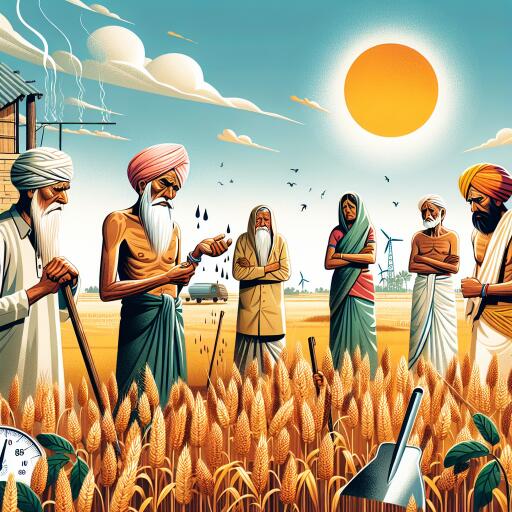
Warm Weather Threatens India’s Wheat Crop Before Harvest: Is Agriculture Sector At Risk?
India, known as one of the world’s primary agricultural powerhouses, is currently facing alarming climate threats that could imperil its wheat production. As global temperatures continue to rise, the far-reaching impacts of climate change are becoming more evident. The specter of unseasonably warm weather during crucial growth phases poses a significant threat to India’s wheat yields.
One of the most substantial risks associated with this warming trend is the decline in wheat output due to high temperatures. Wheat, a staple crop essential to both rural livelihoods and urban supplies, is acutely sensitive to temperature variations. An increase as modest as a 2 degree Celsius above the average can result in decreased grain filling, leading to lighter kernels and reduced yields. This change is particularly concerning given that wheat is a key food staple for the vast majority of India’s population.
The implications of climate change extend beyond agriculture, threatening to hamper India’s broader economic landscape. A report by the World Bank in 2022 underscores the looming economic challenges. The rising temperatures and altered monsoon patterns could potentially shrink India’s GDP by approximately 2.8% by the year 2050. It draws attention to the broader socioeconomic repercussions, with nearly half of the country’s population at risk of experiencing a decline in living standards.
Agricultural stress due to heat waves doesn’t just compromise crop yields; it spells trouble for employment too. Productivity declines, often driven by excessive heat, are already taking a toll. Projections indicate that by 2030, India may account for a significant proportion of global job losses stemming from heat-induced productivity decreases, numbering up to 34 million jobs out of an estimated global figure of 80 million. This stark forecast presents an urgent call for measures to mitigate and adapt to the impacts of extreme weather conditions.
In addition to temperature spikes, shifts in rainfall patterns compound these concerns. The monsoon, a critical seasonal phenomenon that sustains agriculture in the region, is increasingly unpredictable. Erratic rains can lead to floods or droughts, both of which have destructive effects on farming. Such volatility threatens the timely planting and harvesting of crops, which are critical to maintaining food security and stability.
Experts suggest that to buffer against these adversities, India must bolster its agricultural resilience. This involves integrating climate-smart practices and investment in research and development of crop varieties that can withstand higher temperatures and irregular precipitation. Innovations such as drought-resistant and early-maturing crops, along with enhanced irrigation techniques, could play pivotal roles in future-proofing agriculture against climate challenges.
The current climate scenario also necessitates a reexamination of current agricultural policies, subsidization patterns, and infrastructure development. Stakeholders should advocate for comprehensive policy reforms that prioritize sustainable agricultural practices and incentivize farmers to adopt these crucial technologies and methodologies.
Focusing on sustainable development and greenhouse gas emission reduction can further alleviate climatic pressures. By investing in renewable energy and enhancing energy efficiency across sectors, including agriculture, India can work towards mitigating the harsh impacts of climate change. It’s an approach that not only addresses the symptoms but also targets the root causes of a rapidly changing climate.
In conclusion, the imminent threat that climate change poses to India’s agricultural sector is undeniable. The nation stands at a crucial juncture, where decisive, proactive actions can safeguard livelihoods and ensure food security for its population. Preparing now could prevent or mitigate economic losses and job declines, helping to build a resilient agriculture sector that can withstand the test of a warming world.





Leave a Reply